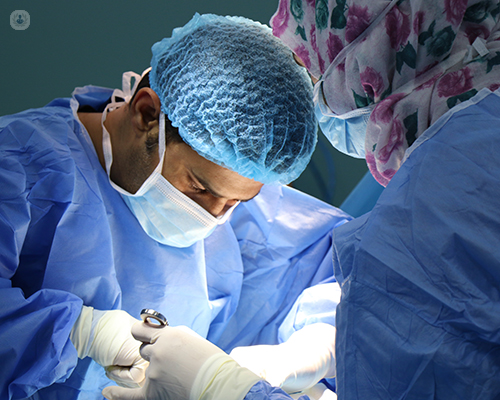Past, present, and future: bowel cancer treatment evolution
Written by:Modern medicine is always evolving and advancing, including bowel cancer treatment. Mr Alexander von Roon, a highly-experienced doctor in this speciality, gives us insight into where the treatment for bowel cancer is headed.

What improvements has bowel cancer treatment seen so far?
Surgery for bowel cancer has evolved and improved hugely in the last 25 years. This first started with the realisation that outcomes for rectal cancer surgery were much better if the rectum (back passage) was removed along the line of the embryological plane around it – this is called total mesorectal excision (TME). As surgeons worldwide were trained in this technique, local recurrence rates of rectal cancer went down and survival rates improved. Next came the transition from open to keyhole surgery for bowel and rectal cancer, which results in less surgical trauma, smaller scars, less postoperative pain, and a faster recovery. Keyhole surgery is now considered the standard of care for most colorectal cancer surgery, but in some very complex cases open surgery is still the best.
How is bowel cancer treatment evolving?
The old saying that prevention is better than cure is definitely true for bowel cancer. Around one-third of people develop small benign growths called polyps in the lining of their large bowel by the age of 60. Although most of these polyps will remain small and benign, some grow and progress into bowel cancer. There is now very good evidence that removing polyps at colonoscopy significantly reduces the risk of developing or dying from bowel cancer in the long-term. That’s why the UK National Bowel Cancer Screening Programme tests people’s stool for blood every two years. A positive stool (FIT) test can be a sign of polyps or cancer in the bowel that are not causing symptoms yet. We expect to see death rates from bowel cancer fall significantly in future as the screening programme begins to have more of an impact.
Keyhole surgery is technically very challenging, especially in tight spaces like the pelvis. Robot-assisted keyhole surgery (often called ‘robotic surgery’ for short) offers real advantages here and is increasingly being used in leading colorectal surgery units. There is good evidence that in men, who have a narrower pelvis than women, conversion rates from keyhole to open surgery are lower. Surgeons who regularly perform robotic surgery believe that it is possible to perform colorectal cancer operations with much more surgical precision, as they can make much finer movements with the robot and are in full control of all aspects of the operation (keyhole surgery is quite reliant on having a skilled assistant). Robotic surgery therefore makes it easier to achieve precise dissection of the bowel cancer in the embryological plane around the bowel.
Advanced endoscopic and minimally invasive techniques are also having an impact on early rectal cancer – it is now possible to remove some small and early rectal cancers by colonoscopy with a technique called endoscopic mucosal dissection (ESD) from the inside of the rectum. This can also be done by keyhole surgery through the anus, a technique called transanal minimally invasive surgery (TAMIS). It is a good option for elderly patients with other illnesses who are not fit for big cancer surgery. However, there is some controversy about whether spread to the lymph nodes from the early rectal cancer can be adequately assessed by MRI scanning only, as they are left behind in the body, and whether radiotherapy should be given to treat these lymph nodes. A number of trials are investigating these questions.
Oncologists have also made significant progress recently in tailoring chemotherapy to specific bowel cancer types through performing genetic sequencing on the tumour cells. They can now add specific immune therapies to standard chemotherapy that activate or block specific growth receptors on the cancer cells. Some of these immune therapies (eg. pembrolizumab or nivolumab) can have a dramatic effect on cancers that are commonly not very responsive to standard chemotherapy, in some cases leading to complete resolution of the cancer. However, they only work for tumours with very specific molecular and genetic signatures.
What areas of treatment research look the most promising?
The concept of TME surgery in the embryological plane has recently also been applied to colon cancer (including the right colon), where it is called complete mesocolic excision (CME). A number of studies have shown that this technique leads to lower rates of local recurrence of the cancer in the years after surgery – around 10 per cent lower for each stage. It is expected that this will translate into better overall survival rates too, although this has not been proven to date. The difficulty with CME surgery, especially for the right colon, is that the blood supply to the bowel is very close to some very delicate structures near the pancreas and it is easy to cause inadvertent bleeding when dissecting in this area. Most centres that perform CME surgery therefore use an open technique, as the majority of surgeons (with a few exceptions) feel that standard keyhole resection is too risky. Robot-assisted keyhole surgery allows the surgeon to have much more control over the operation and therefore makes CME surgery with a keyhole technique accessible to more surgeons. We therefore predict that as more surgeons become proficient in robotic surgery and perform robotic CME surgery for colon cancer, local recurrence rates (and hopefully long-term survival rates) will improve.
Finally, new approaches are emerging on how to combine surgery, radiotherapy, and chemotherapy when treating bowel cancer. For instance, rectal cancers are often treated with radiotherapy to shrink them down prior to surgery, which is then followed by chemotherapy. Colon cancer can’t be treated by radiotherapy because, unlike the rectum, the colon does not stay in a fixed place and radiotherapy would cause too much damage to surrounding tissues. However, you can shrink some colon cancers by giving chemotherapy before surgery, and a recent trial (FOxTROT) used this approach. It found that just under 60 per cent of tumours responded at least partially to treatment with chemotherapy before surgery, without causing worse complications after surgery. Long term survival data are still awaited, but if they show an improvement, it is possible that more colorectal units will adopt a ‘chemotherapy before surgery’ approach for some colon cancers.
If you would like a consultation about bowel cancer, you can go to Mr von Roon's Top Doctors profile and book a visit.



